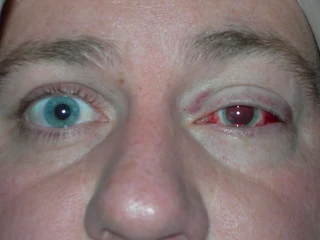 Did you know that a detached retina is a serious and sight-threatening event, occurring when the retina
becomes separated from its underlying supportive tissue?
Did you know that a detached retina is a serious and sight-threatening event, occurring when the retina
becomes separated from its underlying supportive tissue?Did you know that the retina cannot function when these layers are detached. And unless the retina is reattached soon, permanent vision loss may result?
Did you know that if you suddenly notice spots, floaters and flashes of light, you may be experiencing the warning signs of a detached retina?
Did you know that your vision might become blurry, or you might have poor vision and you have a case where your vision is not affected?
Did you know that one in seven people with sudden onset of flashes and floaters will have a retinal tear or detachment, according to a study reported in late 2009 in the Journal of the American Medical Association?
Did you know that no pain is associated with retinal detachment?
Did you know that Extremely nearsighted people have longer eyeballs with thinner retinas that are more prone to detaching?
Did you know that Surgery is required to repair a detached retina?
Did you know that reattaching a retina is a procedure is performed by a retinal specialist — an ophthalmologist who has undergone advanced training in the medical and surgical treatment of retinal disorders?
- Scleral buckling surgery. This is the most common retinal
detachment surgery, and consists of attaching a small band of silicone
or plastic to the outside of the eye (sclera). This band compresses
(buckles) the eye inward, reducing the pulling (traction) of the retina
and thereby allowing the retina to reattach to the interior wall of the
eye.
The scleral buckle is attached to the posterior portion of the eye and is invisible after surgery.
Scleral buckling surgery often is combined with one of the following procedures to fuse the retina to its underlying supporting tissue (called the retinal pigment epithelium, or RPE). 
- Vitrectomy. In this procedure, the clear jelly-like fluid is removed from the posterior chamber of the eye (vitreous body) and replaced with clear silicone oil to push the detached portion of the retina back onto the RPE.

- Pneumatic retinopexy. In this procedure, the surgeon injects a
small bubble of gas into the vitreous body to push the detached portion
of the retina onto the RPE.


Now if you didn't know, now you know...
To see more did you know that trivia click here


1 comment:
This concept is a good way to enhance the knowledge. Thank you for share it.Myopia Specialist in Bristol,Retina Specialist in Bristol.
https://www.momajid.com/eye-care.php?epiretinal-membrane-in-bristol&id=16
Post a Comment